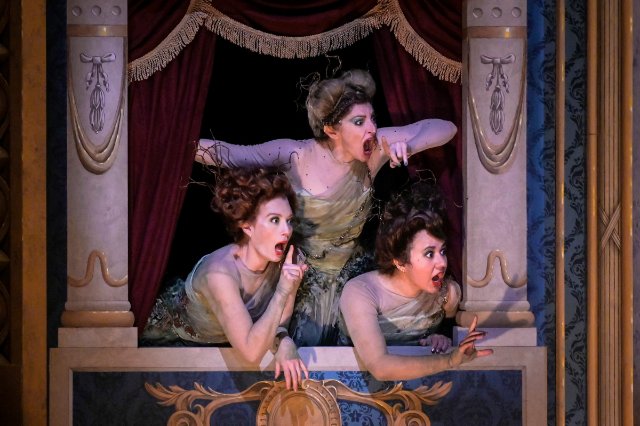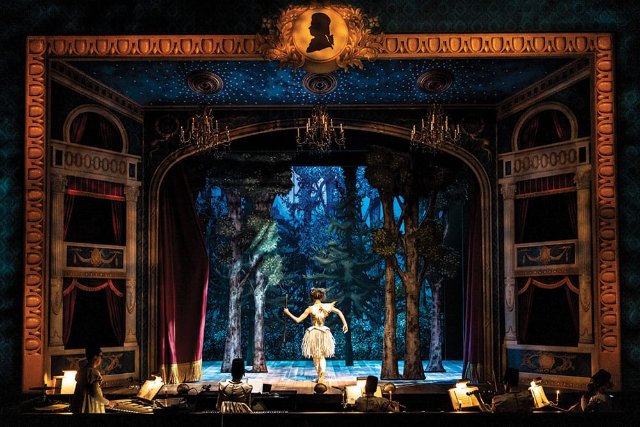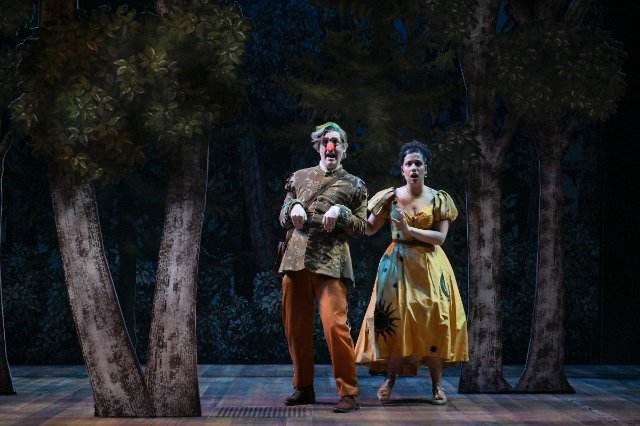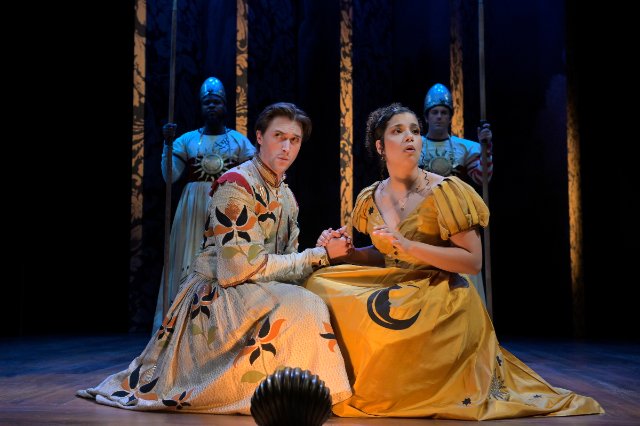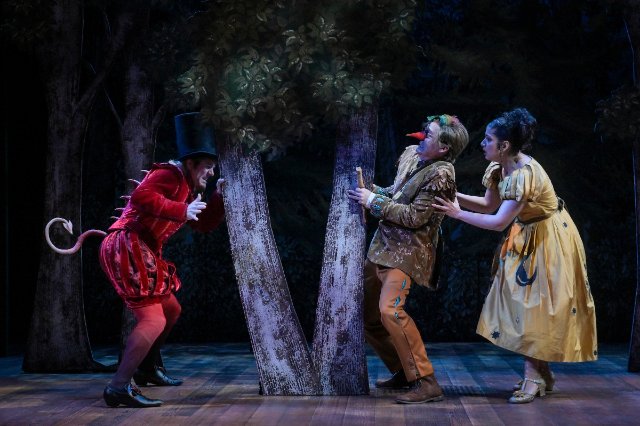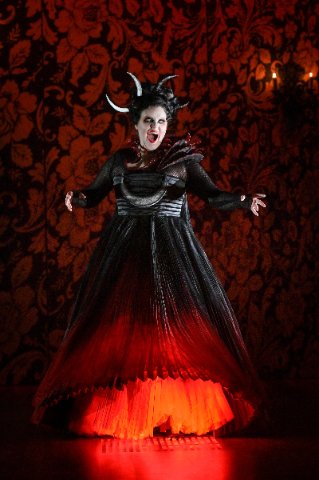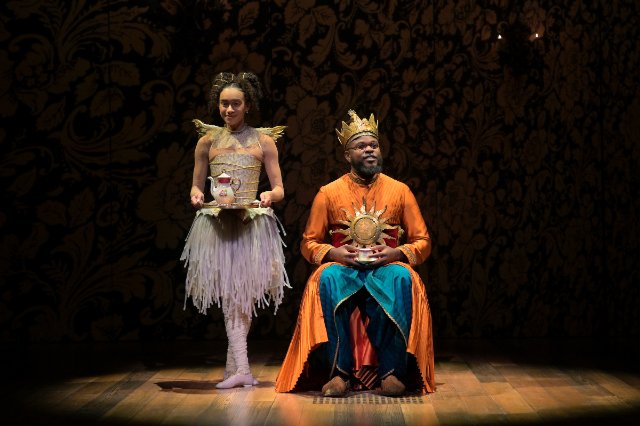The Matchbook Magic Flute
Mary Zimmerman's Adaptation of Mozart's Masterpiece
By: Victor Cordell - Nov 03, 2024
Berkeley Rep presents the Goodman Theatre (Chicago) production of Wolfgang Amadeus Mozart’s last and highly popular opera, Die Zauberflöte (The Magic Flute). Mary Zimmerman has adapted the libretto and score into The Matchbox Magic Flute and directs as well. The result is a crowd-pleasing gem – creative, visually captivating, unerringly funny, and replete with beautiful music.
This version is abbreviated from the original, but without (further) loss of plot continuity. It uses vocal amplification, so that singers are able to perform several nights in a row, not possible with the demands of traditional opera. Singing and speaking are loosely adapted into vernacular English. The chorus is eliminated and along with it the significant number “O Isis und Osiris.” It retains all of the humor of the original but drops most of the ritual solemnity of the story that may be inferred to suggest Masonic practices, both Mozart and the librettist Emanuel Schikaneder having been Masons.
So, do good things come in threes? ‘Tis the season of the flute, as the Bay Area has been blessed in the last six months with three variations – very different full-length opera productions of The Magic Flute at both San Francisco Opera and Opera San Jose, and now this abridged The Matchbox Magic Flute plays at Berkeley Rep. Coincidentally, three is a significant number in Masonic lore, and for instance, this opera contains three ladies, three boys, three spirits, three doors, and three trials. And the musical score is written mostly in the signature key of E-flat, whose scale has three flats. Are we onto something here?
First impressions matter, and this production delivers. The descriptor “matchbox” becomes evident as Todd Rosenthal’s stage width for the proscenium arch is reduced by perhaps 40%, leaving a charming, intimate, colorfully-framed space that gives the look of a puppet-show stage, particularly when the larger performers are in the scene. Ana Kuzmani?’s fanciful costumery adds to the fairy tale look.
The story opens with three unnamed Ladies. In most stage works, coveys like this trio would act as a somewhat inert Greek chorus. Here, they are radically expressive; sing attractive harmonies; help drive the plotline; and even slay the dragon that was about to devour Tamino! As an example of the sassiness of the modernistic script, while the Ladies lean over the unconscious body of Tamino, one observes longingly “He must spend a lot of time at the gym.”
The narrative concerns Prince Tamino who falls in love with Pamina, the missing daughter of the Queen of the Night, having only been shown Pamina’s portrait. Accompanied by the Queen’s silly bird-catcher, Papageno, who also seeks a wife, Tamino strives to rescue the damsel from purported kidnapping by High Priest Sarastro, enemy of the Queen. Tamino and Papageno must conquer three trials before being granted their wishes.
Like many heroes, Tamino (Billy Rude) is stolid and self-controlled. Though his part is well acted, the character is somewhat uninteresting. Papageno (Shawn Pfautsch) gives the action its comic center with his frittering, blundering, and absence of courage; and the leitmotif played often on his woodwind recorder is one of the most memorable phrases from the opera.
The most famous music from the opera has found its way into popular culture – “Hell’s vengeance boils my heart,” known popularly as the Queen of the Night’s aria. While Emily Rohm acts the role with daunting ferocity and sings with accuracy, the staccato, coloratura passages are more caressed than piercing which would bring forth the venomous intent. The aria is a threat to daughter Pamina (Marlene Fernandez), who has one of the better trained voices in the cast as well as a substantial range that the role demands. Her duet (“In men, who feel love”) and trio (“Just come in”) that include Papageno are very appealing, and like many ensembles, the combined voices produce a very nice sound, better than the individuals.
The culmination brings the players together under the aegis of Sarastro. This role is written for a basso profundo, as the range goes deep into the cellar of human vocal potential. The player, Fernando Watts, is one of the few in the cast with opera cred, and he hits the low marks and projects with an assist from the amplification.
So, does this adaptation portend a new future for opera, an art that is radically expensive to produce but is largely tamed by this type of revision? Notably, the orchestra is reduced from fiftyish musicians to a very effective five. Also, only 11 singers are required, and rather than highly specialized and trained artists, most can be stage-musical singers. If there is a weakness in this particular realization, it is that the singers should be uniformly strong throughout, yet there are significant weaker links.
This adaptation proves more accessible to an audience comfortable with musicals – in style and length. Most operas were written in eras with different preferences. Mid-19th century French opera demanded five acts including a ballet scene. Wagner wrote several operas that require four to five hour run times. The breezy informality and two-hour run time of The Matchbox Magic Flute speak more to the preferences of today.
That said, this formula is not new. For instance, Baz Luhrmann’s adaptation of La Boheme had moderate success on Broadway 20 years ago. Also, “Legend of the Ring” condenses Wagner’s 15-hour Ring Cycle into a manageable three hours. But these updated versions didn’t start a trend.
However, there are prospects for many more variations like The Matchbox Magic Flute that appeal to prospective new audiences for opera. And this work highly entertains in serving that purpose. Nonetheless, aficionados of the traditional form, who appreciate the unadulterated power and beauty of the natural trained voice, are less likely to be persuaded.
The Matchbox Magic Flute with music by Wolfgang Amadeus Mozart, libretto by Emanuel Schikaneder, adapted by Mary Zimmerman, and produced by Berkeley Repertory Theatre plays on its stage at 2025 Addison Street, Berkeley, CA through December 8, 2024.

